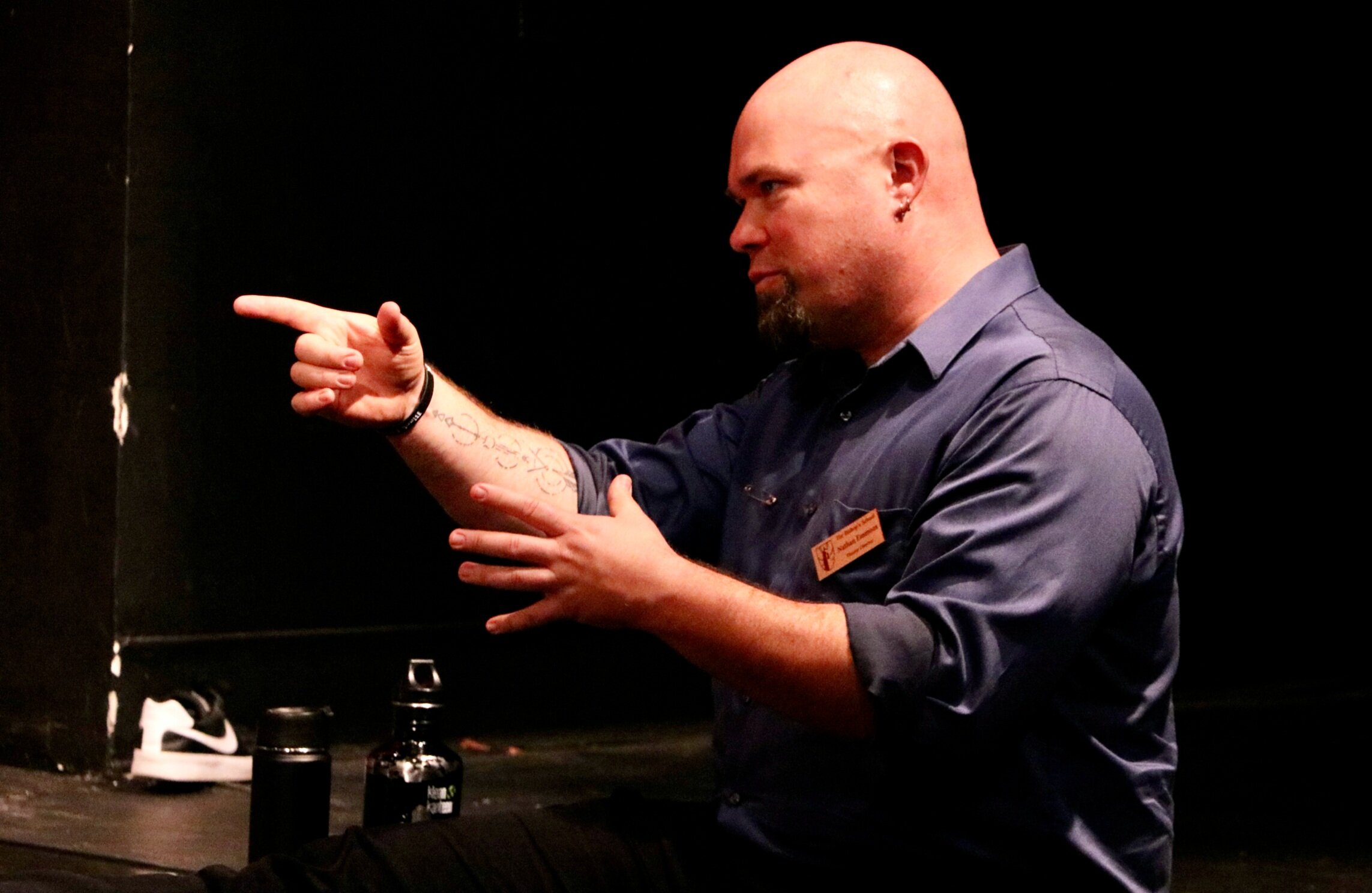
Educator
Acting Workshop
Theatre is an art form that is forever evolving as it moves with and reflects the society that surrounds it. The course emphasizes the importance of working individually and as a member of an ensemble to take part in these explorations of culture and universal truths about humanity. In a more concrete sense, it is also designed to encourage students to research and explore a variety of theatrical forms and functions from around the world and throughout history. Students will have the opportunity to develop the organizational and technical skills needed to express themselves creatively in theatre in both scripted and devised pieces. This course involves the development of performance skills through working on devised and scripted scenes, study of drama from the point of view of the director, and a theatre production.
Acting Workshop is designed as an academic and performative apex of a study of theatre begun in Introduction to Theatre. Herein, we seek to elevate student engagement with theatre to the personal, owning its creation, both collaboratively and individually, its development, and its delivery of powerful story to the global community. Acting Workshop is rigor, defined and embodied by and through the students who take on this challenge.
Advanced Acting and Directing
This course will prepare students for more intensive theatre arts courses, enabling students to develop and refine their understanding and application of the art of theatre and theatrical performance by researching, designing, reporting on and performing in theatre exercises, presentations and full productions. It is a continuation and deeper application of the principles and techniques introduced in Theatre Arts I and II, though this course will require a much higher commitment on the part of the student, particularly in the areas of theory & research. It will examine theatre studies from a global perspective, taking into account the international traditions and movements that have shaped the development of world theatre from its earliest times. Students will reflect and report upon personal and universal themes and concerns expressed in dramatic literature from various cultures and historical traditions in order to understand, appreciate and participate in the performing arts.
Movement for Theatre
This course provides theatre students with the opportunity to study and explore a variety of types of physical theatre from both traditional and contemporary styles. In this course, students develop and/or enhance their performance by studying different styles of movement and combat used in theatre, both in contemporary and historical contexts. Topics include Viewpoints, Commedia dell'Arte, Devised Physical Theatre, Greek Chorus, and armed and unarmed combat. They will have opportunities to perform and direct both in classroom projects and for general audiences. Students will create, perform, and critique their own scenes to demonstrate their mastery of the skills examined. Opportunities for original work, improvisations, and individual and small group projects will be included. Students will explore the essential question of how the development of physical techniques influences theatrical performances.
Page to Stage
Storytelling is the most common way that we communicate to one another. Theatre is an art form that is forever evolving as it moves with and reflects the society that surrounds it. Students in this interdisciplinary course learn and practice the two essential approaches to drama − close reading of text and performance on stage. Using a different play each quarter (Shakespeare in the first quarter, a more recent play in the second quarter), students begin with the traditional work of literary analysis, reading the play closely in the classroom. Then students become actors, memorizing lines, blocking scenes and exploring possibilities while working together to stage a pared-down production. This course involves the development of performance skills through close reading of plays: structures, characters, and themes. Through class discussion and active experimentation with acting techniques, students will experience both a deeper understanding of theatre as a literary genre and artistic craft, active performance reading and delivery with an eye to quarterly culminating performances of scenes and monologues in front of a Bishop’s audience.
Film as Literature
This course is designed to shift student perception from passive observer to active critic and engage deep textual analysis of film as a text reflecting social, political, and cultural narrative. The course will cover film as a medium from its creation through a variety of genre and theme-based lenses. Additionally, students will learn how to analyze critically the building blocks of film, including the mise-en-scene, cinematography, editing and sound design. Akin to the study of poetry or the novel as modes of literature, this course will analyze film using elements of filmmaking and how genre is influenced by and manifest through these elements. This is a writing intensive course, in which movies will be examined in the same way literature is in English.
Introduction to Theatre
This course is designed to introduce the basic performance skills required in acting. Emphasis is placed on utilization of the voice and the body, understanding and use of theatre vocabulary, analysis and of interpretation of texts and other materials, appreciation of the art form, and assessment of self and others. Because there is little homework in this class, your creativity, imagination, and enthusiasm will be your tools for success and enjoyment of this class. Be ready to jump up, offer ideas, and support your fellows in their endeavors as we learn collectively about theatre.